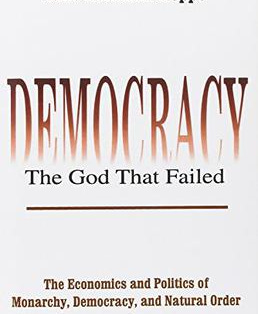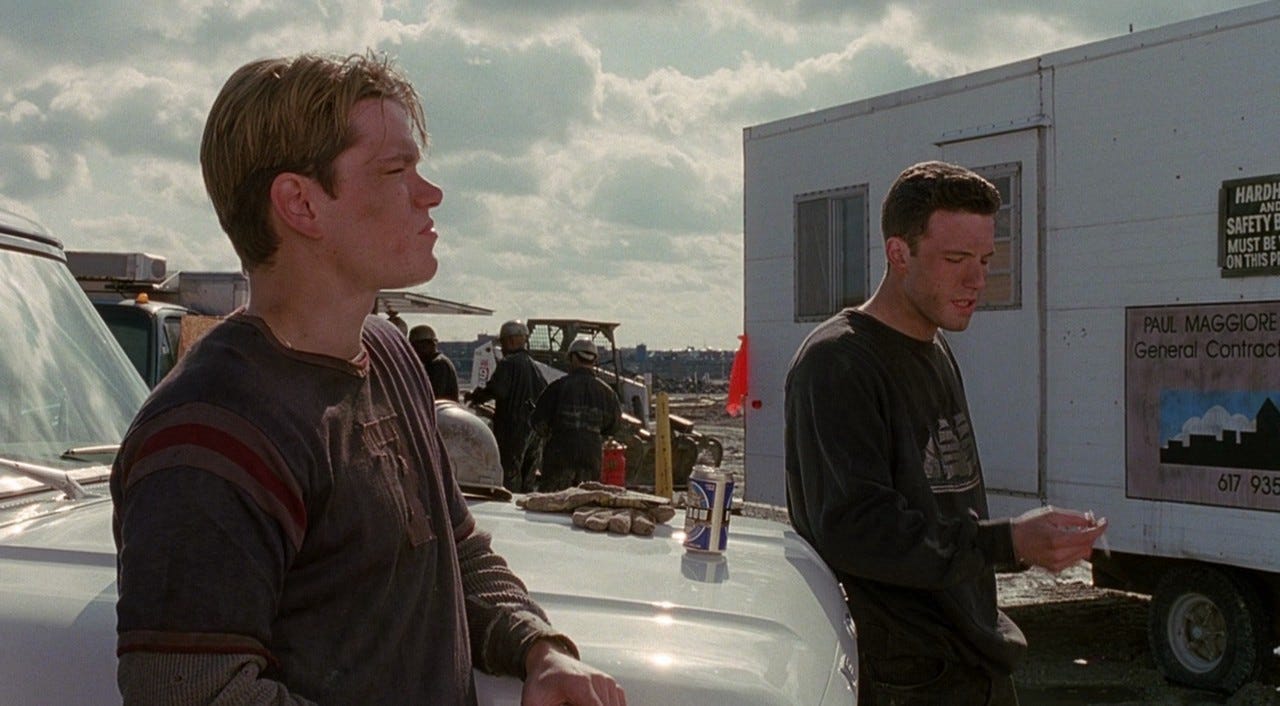Matt & Ben, Playing Us for Suckers
The boys from Boston want us to invest in crypto and bet on sporting events.
In 2002, I went to see a new satirical Off Broadway play called “Matt & Ben.” The premise was that the script for Good Will Hunting, which had won the titular Damon & Affleck an Academy Award for Best Original Screenplay in 1998, had literally fallen out of the sky, fully formed, with their names on it. Adding to the fun: the eponymous duo were played by 1) women who 2) looked nothing like them.
John Simon’s withering review of that play in New York magazine began, “If you are under 30. . . live physically or mentally in the East Village, derive your intellectual sustenance from cult movies and pop culture, and think that Matt Damon and Ben Affleck’s Good Will Hunting rates a toothless spoof stretched out to 70 minutes, then ‘Matt & Ben’ is for you.” I was 29, had just moved out of the East Village, was extremely interested in pop culture, and, like every young(ish) writer who had ever dreamed of writing for Hollywood, could not fathom that those two Massachusetts knuckleheads had produced something Oscar-worthy. “Matt & Ben” helped restore my faith in humanity. (Only recently did I realize that one of the two playwrights, the one who played Ben in the performance I saw so long ago, was Mindy Kaling, of The Office fame.)
The real Matt and Ben have been in our lives since the mid-90s. Matt Damon was the talented Mr. Ripley and the Martian and Linus in the Ocean’s 11 movies. Ben Affleck was Batman and Daredevil and the comic book guy in Chasing Amy (and half of “Bennifer”). They are both, I think, legitimately talented actors, always better in a movie than I expect them to be. That neither of them have written anything of note since 1997, however, lends credence to Kaling’s “screenplay from the heavens” theory.
Matt and Ben are on my mind because they are both starring in commercials that have been playing on a loop during the last few weeks of NFL broadcasts: for Crypto.com and WynnBet, respectively. Movie stars of their stratum do not usually debase their brands by doing ads—and certainly not ads for controversial products. What the heck were the boys thinking, lending their names and likenesses to a cryptocurrency exchange and an online sports betting app?
In the Crypto.com commercial—produced by David Fincher!—Damon is striding powerfully toward us, down some sort of futuristic corridor. He’s wearing a black t-shirt and black pants, looking more like Jason Bourne Matt Damon than Guy Who Bought the Zoo Matt Damon. He’s evoking memories of profound human accomplishment, which images flash on the screen as he marches: explorers, astronauts, Wright brothers. His confident presence, combined with those images and the final one of Mars, calls to mind his film The Martian, in which his character resolutely endeavors to survive on the red planet and return home. It’s stirring stuff.
“In these moments of truth,” he’s saying, “these men and women, these mere mortals, just like you and me, as they peer over the edge, they calm their minds and steel their nerves with four simple words that have been whispered by the intrepid since the time of the Romans: Fortune favors the brave.” The implication is that the true pioneers, men of real courage like Neil Armstrong and Edmund Hilary, would absolutely invest their life savings in [insert name of cryptocurrency of choice]. He may as well be reciting the line from Heathers: “Life sucks losers dry. If you wanna fuck with the eagles, you gotta learn how to fly.”
Bitcoin, the most mainstream of the cryptocurrencies, is not pegged to a central government’s bank. Its champions tout this as an advantage (I personally disagree—call me crazy, but I kind of like my money backed by the full confidence of the United States of America). But it is pegged, in a way, to the price of electricity, which is consumed in vast quantities to “mine” new bitcoin. There is no question that crypto is awful for the environment—and a complete and total waste of precious energy resources. There is also no question that it is the currency of choice for organized crime syndicates—crypto combines the anonymity of cash with the ease of online banking. At this stage of the game, burning up fossil fuel to make more pretend money for libertarian douchebros and organized crime figures seems the height of Don’t Look Up hubris.
The best case scenario for crypto is that it’s horrific for the environment and that’s all. But is that all? Aja Raden, the author of The Truth About the Lies, calls it a Pyramid scheme.
“Bitcoin isn’t currency,” she writes, “because people don’t spend it. . . . It’s not meant to be spent. It’s meant to be hoarded.” She continues:
So if Bitcoin theoretically has a finite supply and its value only goes up, you can see how, as with any Pyramid, you really needed to get in on that a long time ago. Like any MLM, the people at the bottom think they’re investing in something that will make them very rich—but as time goes on, there will be fewer, generally more unobtainable Bitcoins, and the people holding vast sums . . . will have almost all of them—and they’ll be worth a fortune, because the rest of us made it so when we bought in.
Hey, look! A fucking Pyramid!
The researcher Dave Troy goes even further in his condemnation of cryptocurrency:


Whether Ponzi scheme, Fascist attack on democracy, or both, cryptocurrency certainly has all the hallmarks of a giant swindle.
But Crypto.com isn’t a cryptocurrency; it’s a cryptocurrency exchange. There are 13 exchanges that are larger, including one called—I swear this is a real thing—Kraken. The company Matt Damon’s promoting generates revenue when customers use their service to buy crypto. If cryptocurrencies are a scam, then, cryptocurrency exchanges help the fool and his money part sooner and more efficiently.
This bit about Crypto.com is from the New York Times:
That company, which was founded as a start-up named Monaco in 2016, is a cryptocurrency exchange that also offers digital wallets and crypto-backed debit cards. It has its headquarters in Singapore but maintains addresses in Malta, the United Kingdom and Ireland. Its chief executive, who is also its majority shareholder, previously ran a failed daily deals site for Southeast Asia. The company is privately held and has raised no institutional funding.
That company, which six years ago did not exist, last month secured the naming rights for the Los Angeles arena formerly known as the Staples Center for a whopping $700 million—which is, like, a lot of bread. How much cash do these people have, if they can plonk down naming rights to “The Crypt?”1 Who are they, that they can access such vast sums? Is it enough to make Forbes “30 Under 30” list? Where is all this dough coming from? Is it venture capital? Are that many normies really investing in this stuff? How much of that seed money did they fork over to Matt Damon, to lend his celebrity imprimatur to Crypto.com and invite us to “embrace the moment . . . and commit?”
Just like in Good Will Hunting, Ben Affleck is more modest and less pretentious than his collaborator in his corporate shilling. His commercial for WynnBet, a new online sports book app, is a fun, Ocean’s 11-style romp. Like Matt, Ben is wearing all black. Like Matt, Ben spends the entire commercial walking around. Unlike Matt, Ben doesn’t take himself too seriously.
I love sports—always have. I regularly listen to not one but two sports gambling podcasts. I don’t wager myself, but I understand the appeal, and I certainly don’t object to anyone else taking the Chiefs Money Line. However, things have gotten out of hand. Time was, to bet on a game, you had to go to Vegas or find a bookie. Professional sports leagues didn’t want to locate teams in Las Vegas, for optics—to keep the sports book separate from the sports.
No more. Over the last three years or so, the Raiders have moved to Vegas, and online betting industry has made enormous inroads. What was once available in only a few states is now legal in many more, including—as of this past weekend—New York. It is all over my Twitter feed:
Not only that, but sports book companies like Fan Duel, Draft Kings, and the newly-minted Caesars Sportsbook—which has an amusing-if-annoying ad campaign starring JB Smoove, Halle Berry, and Patton Oswalt—have poured a shit-ton of money into advertising. It’s one thing to advertise on a podcast intended for adults. But sports book companies run ads during NFL games, all afternoon on Sundays, where plenty of kids are watching—kids with access to smartphones. For eons, broadcast networks wouldn’t allow ads for hard liquor at times when children might tune in; we’re suddenly okay with kid-friendly commercials for online gambling?
Just as drug dealers give away the first sample of their product for free, so these companies offer specials, so your first bet is “free.” As the above graphic shows, Caesars Sportsbook is basically giving you $300 of house money to make your first bet—which is very enticing. Why not bet the Chiefs this weekend? There’s no way in hell the Steelers are beating them at Arrowhead.
Left unsaid by Affleck—who, with his history of poker playing, is hardly some Vegas naïf—is the ugly truth: the money used to finance all these ads comes from gamblers losing their bets. What’s the adage? The House always wins. Because: math. The only reliable winners here are the casinos, which are owned by the likes of Sheldon Adelson and Steve Wynn, men who profit off of human misery—and then invest some of their vast fortunes into financing GOP political candidates.
Matt Damon is not really Jason Bourne, or the Martian, or Tom Ripley. Ben Affleck is not really Batman, or Daredevil, or even Larry Gigli. They are actors. Good ones. And while they may come across as confident, worldly wise, and wicked smaht, they remain two Boston guys whose intellectual prowess was so dubious that Mindy Kaling wrote an entire play based on the extremely believable premise that Matt and Ben could not possibly have written Good Will Hunting—a play that, despite that caustic review, was successful.
Both actors are now promoting products that are likely to lose you money if you use them. Kaling, it seems to me, was on to something.
How you like them apples?







One of your better columns.
In 2014 I invested $5 in Bitcoin. Every time it got to $10, I sold and reinvested $5. Today my total capital is $83, due probably as much to inflation as anything else. But like a lottery ticket, it’s just a way to lose money. You’re absolutely right. I tried it mostly to give myself an incentive to pay attention to it, and ended up writing a novel in which a young California kid cracks a crypto gang trying to take over the world’s money flow. All fun, instructive, etc., writing for me…not sure the premise was any better understood than Bitcoin itself.
So thanks for making the scam clear. Everybody falls for Bernie Madoff sooner or later. I, too, thought Matt Damon was a better guy than this.
Sorry, Mindy, but I'm fairly sure Matt and Ben did actually write Good Will Hunting in the back room of Chez Jay bar and restaurant in Santa Monica. (I documented it as part of getting Chez Jay landmarked so the city couldn't sell their lease to a crappy chain restaurant. Not true that the Pentagon Papers were transferred there. True that Secret Service agents waited there while JFK met up with Marilyn Monroe.) That doesn't excuse signing on to ruin people's lives and enrich horrible people by promoting gambling in the worst way imaginable.